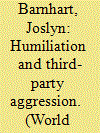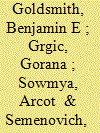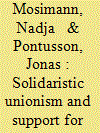|
|
|
Sort Order |
|
|
|
Items / Page
|
|
|
|
|
|
|
| Srl | Item |
| 1 |
ID:
154390


|
|
|
|
|
| Summary/Abstract |
The transition from Fordist manufacturing to the so-called knowledge economy confronts organized labor across the advanced market economies with a new and more difficult landscape. Many scholars have suggested that the future of egalitarian capitalism depends on forging new political coalitions that bridge the interests of workers in the “new” and “old” economies. This article explores current trajectories of change in Denmark and Sweden, two countries that are still seen as embodying a more egalitarian model of capitalism. The authors show that labor unions in these countries are pursuing two quite different strategies for achieving social solidarity—the Danish aimed at equality of opportunity and the Swedish aimed at equality of outcomes. The article examines the origins of these different strategic paths and explores the distinctive distributional outcomes they have produced. The conclusion draws out the broad lessons these cases hold for the choices currently confronting labor movements throughout the advanced industrial world.
|
|
|
|
|
|
|
|
|
|
|
|
|
|
|
|
| 2 |
ID:
154393


|
|
|
|
|
| Summary/Abstract |
There is a growing consensus that status concerns drive state behavior. Although recent attention has been paid to when states are most likely to act on behalf of status concerns, very little is known about which actions states are most likely to engage in when their status is threatened. This article focuses on the effect of publicly humiliating international events as sources of status threat. Such events call into question a state's image in the eyes of others, thereby increasing the likelihood that the state will engage in reassertions of its status. The article presents a theory of status reassertion that outlines which states will be most likely to respond, as well as when and how they will be most likely to do so. The author argues that because high-status states have the most to lose from repeated humiliation, they will be relatively risk averse when reasserting their status. In contrast to prior work arguing that humiliation drives a need for revenge, the author demonstrates that great powers only rarely engage in direct revenge. Rather, they pursue the less risky option of projecting power abroad against weaker states to convey their intentions of remaining a great power. The validity of this theory is tested using an expanded and recoded data set of territorial change from 1816 to 2000. Great powers that have experienced a humiliating, involuntary territorial loss are more likely to attempt aggressive territorial gains in the future and, in particular, against third-party states.
|
|
|
|
|
|
|
|
|
|
|
|
|
|
|
|
| 3 |
ID:
154392


|
|
|
|
|
| Summary/Abstract |
Although some scholars claim that the empirical evidence for the very low instance of interstate war between democracies is well established, others have raised new challenges. But even if democratic peace is observed, its theoretical explanation remains unresolved. Consensus has not emerged among competing approaches, some of which are criticized for offering monadic logic for a dyadic phenomenon. This article synthesizes recent literature to advance a simple, but distinct, explicitly dyadic theory about institutionalized political competition, leading to expectations that it is the most important source of democratic peace. While the authors are far from the first to consider political competition, their approach stands out in according it the central role in a dyadic theory focused on the regime type of initiators and target states. They argue that potential vulnerability to opposition criticism on target-regime-specific normative and costs-of-war bases is more fundamental than mechanisms such as audience costs, informational effects, or public goods logic. Incumbents in high-competition states will be reluctant to initiate conflict with a democracy due to anticipated inability to defend the conflict as right, necessary, and winnable. The authors present new and highly robust evidence that democratic peace is neither spurious nor a methodological artifact, and that it can be attributed to high-competition states’ aversion to initiating fights with democracies.
|
|
|
|
|
|
|
|
|
|
|
|
|
|
|
|
| 4 |
ID:
154395


|
|
|
|
|
| Summary/Abstract |
This article discusses three recent books that analyze patterns of political conflict and regime change in postcolonial Asia and Africa using a social forces approach to political analysis. The social forces tradition, originally pioneered by Barrington Moore, studies the social origins and political consequences of struggles between social groups whose members hold shared identities and interests. The works under review examine, respectively, the varied regime trajectories of Southeast Asia's states, divergent regime outcomes in India and Pakistan, and the institutional origins of social cleavages and political conflict in sub-Saharan Africa. Although historically the social forces paradigm has focused on conflict between class actors, the author argues that these three works fruitfully extend the social forces approach to encompass struggles between nonclass social groups, including those defined along the lines of ethnicity, religion, nationality, region, and family. This pluralized version of the social forces approach is better suited to studying patterns of regime change in Asia and Africa, where the paradigm has been less frequently applied than it has been to cases in Europe and Latin America.
|
|
|
|
|
|
|
|
|
|
|
|
|
|
|
|
| 5 |
ID:
154391


|
|
|
|
|
| Summary/Abstract |
Using data from the European Social Survey (2002–14), this article explores the effect of union membership on support for redistribution. The authors hypothesize that the wage-bargaining practices of unions promote egalitarian distributive norms, which lead union members to support redistribution, and that this effect is strongest among high-wage workers. Consistent with the authors’ expectations, the empirical analysis shows that the solidarity effect of union membership is strongest when unions encompass a very large share of the labor force or primarily organize low-wage workers. The authors also show that low-wage workers have become a significantly less important union constituency in many European countries over the time period covered by the analysis.
|
|
|
|
|
|
|
|
|
|
|
|
|
|
|
|
|
|
|
|
|